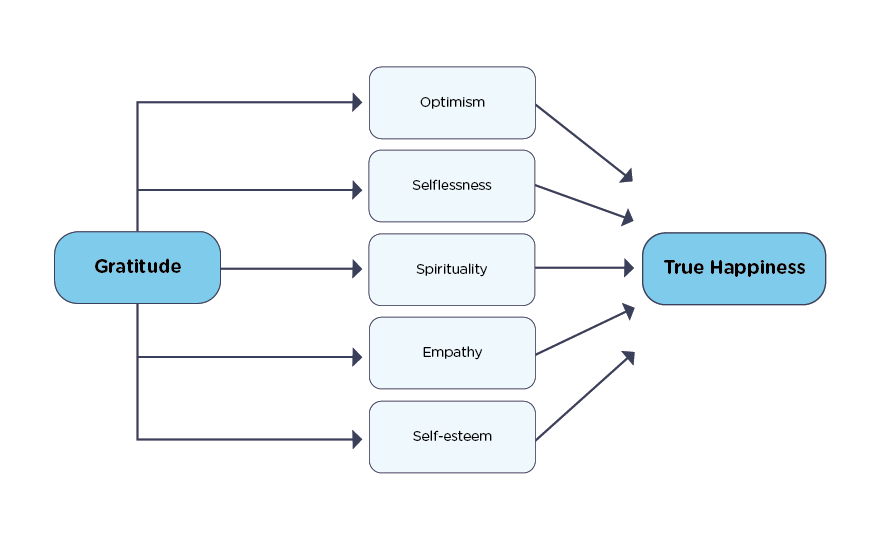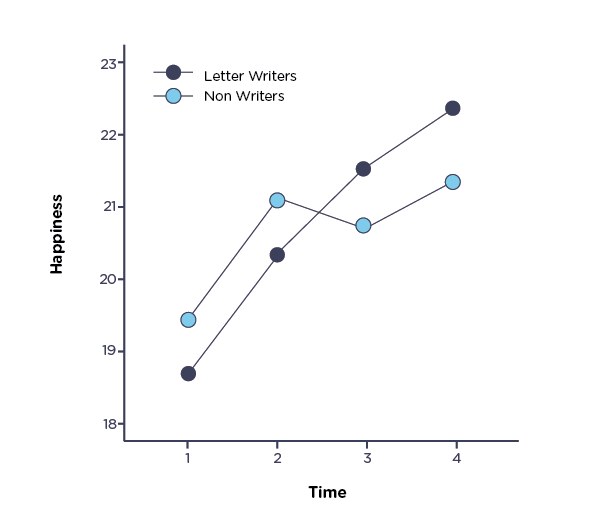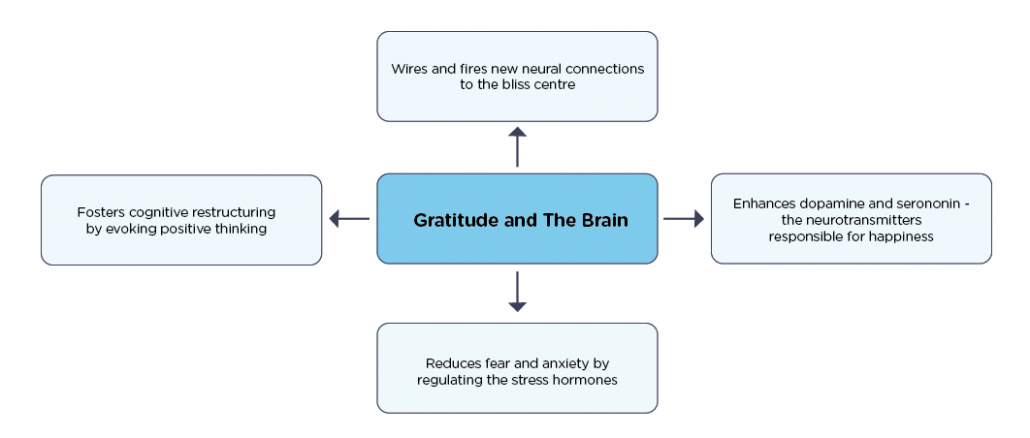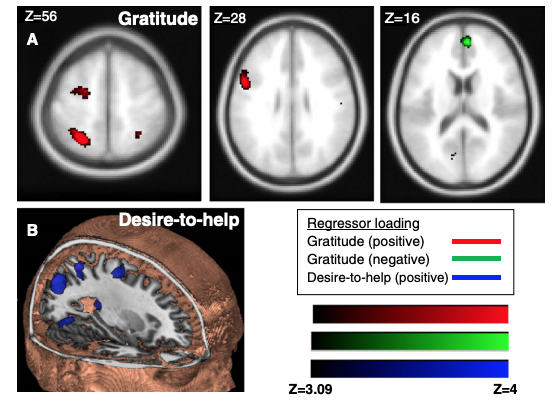We include products in articles we think are useful for our readers. If you buy products or services through links on our website, we may earn a small commission.
Practicing Gratitude: A Beginner’s Guide

“Cultivate the habit of being grateful for every good thing that comes to you, and to give thanks continuously. And because all things have contributed to your advancement, you should include all things in your gratitude.”
― Ralph Waldo Emerson
Table of Contents
What is Gratitude?
Gratitude is a state of thankfulness and appreciation. The ability to feel gratitude is universal. It’s part of our evolutionary history, which means that gratitude is “hardwired” in the human brain.
Practicing Gratitude
To practice gratitude researchers identify a two-step process. (1)“recognizing that one has obtained a positive outcome” and (2) “recognizing that there is an external source for this positive outcome.”
More than a Feeling
Positive events like getting a raise or graduating college can inspire joyful feelings of accomplishment and satisfaction. But in order for you to turn these feelings into the practice of gratitude, you have to choose to recognize the outside sources of those events and be thankful for them.
This could mean bringing awareness to the support you’ve received from mentors, parents, family members, partners, friends, or a higher power.
Practicing gratitude means choosing to look at your life with a focus on the sources of your pleasures, joys, and accomplishments.
There are many different ways to practice. Here are a few:
- Gratitude journaling
- Meditating on the sources of happiness in your life
- Telling someone that you are grateful for something they did
- Doing something kind for someone as an expression of gratitude
- Paying mindful attention to moment-by-moment sources of pleasure like bird song, trees, art, music, and other beautiful and pleasurable things
- Giving thanks through prayer and spiritual rituals
Dr. Kiltz’s Gratitude Attitude
Dr. Kiltz sees practicing gratitude as cultivating a “gratitude attitude”. This attitude arises when you realize that you are endowed with a body that’s able to feel incredible sensations, an inquisitive mind, and a creative spirit that you can use to connect with others by expressing your thoughts and feelings.
All this adds up to gratitude for the gift of being you, right now, just as you are.
Yet many people are confused when it comes to gratitude. People often think they need to achieve status, wealth, power, and security before they can appreciate all that they are, and not just what they have.
But research reveals that happiness isn’t what brings you gratitude, gratitude is what brings you happiness.

The Many Benefits of Gratitude
People who regularly practice gratitude by noticing, reflecting upon, and sharing the things they’re thankful for an experience many benefits including:
- More positive emotions
- Stronger immune systems
- Better sleep
- Higher self-esteem
- More and better relationships
Gratitude Increases Happiness and Other Positive Emotions
Research has shown that about 40% of our happiness is accounted for by intentional activity, 50% by genetics, and 10% by circumstances. This suggests that happiness is something that we can cultivate with gratitude practice.
To test this idea, leading gratitude researcher, Dr. Martin E. P. Seligman, assigned 411 people to write and personally deliver a letter of gratitude to someone they had not thanked before. Nearly all participants showed a large increase in happiness. And the benefits lasted for months.

In another study, researchers asked 3 groups of participants to write a few sentences each week on particular topics.
The first group wrote about things they were grateful for that happened during the week.
The second group wrote about things that irritated them. And the third wrote about things that affected them without an emphasis on positive or negative feelings.
After 10 weeks, participants who wrote about gratitude were more optimistic and felt better about their lives. Surprisingly, they also had fewer visits to the doctor and exercised more.
How Gratitude Benefits Your Health
The benefits of gratitude for your health can be understood in the context of mind-body-medicine. This evidence-based approach to health focuses on connections between our minds, bodies, and behaviours to support good health and activate healing.
Since the mind and body are deeply connected it’s no surprise that the benefits of gratitude extend to our health.
Gratitude Strengthens the Immune System
Practicing gratitude strengthens the immune system by:
- Reducing stress
- Improving Sleep
- Increasing optimism
Stress Reduction
Chronic stress can disturb normal immune system responses leading to chronic inflammation–a major contributor to diseases responsible for the majority of deaths across the globe.
Studies show that daily gratitude practice can lead to a 23% reduction in the stress hormone cortisol. In short doses cortisol can act as an anti-inflammatory, but in when your body is in a chronic state of stress the constant presence of cortisol leads to chronic inflammation in the cardiovascular system and throughout the body.
A study looking at health-care practitioners–who work in high-stress environment–revealed that keeping a gratitude diary for two weeks produced sustained reductions in perceived stress (28%) and depression (16%).
Improves Sleep
Numerous studies show that good sleep is critical for a healthy immune system. Practicing gratitude has been shown to improve sleep, even for people with serious health issues and sleep disorders.
One study of people with neuromuscular disorders who made nightly lists of things they were grateful for, found that after 3 weeks participants reported longer and more refreshing sleep.
Another study by University of Manchester researchers looked at the effects of gratitude on sleep for over 400 people, 40% with sleep disorders. Researchers found that gratitude was linked to more positive thoughts and fewer negative thoughts. These thought changes were associated with falling asleep faster, sleeping longer, and higher sleep quality.
Increases Optimism
Studies suggest that optimism boosts the immune system, and can be a factor in healthy aging.
Thankfully, practicing gratitude can improve optimism, even if you’re not a naturally optimistic person.
Another study showed that after only 10 weeks of daily gratitude practice, participants felt more positive and optimistic about their present lives and their futures.
Gratitude Helps You Maintain Self-Care Routines
Self-care routines are key to health and wellbeing, but they’re notoriously hard to maintain. Studies show that 95% of diets fail, and many people find it hard to fulfill their daily goals for physical activity. Practicing gratitude can help.
Researchers have found a positive correlation between gratitude and the likelihood of sticking to self-care regimens, like doing yoga and healthy eating. 1
Gratitude practices have been shown to keep people focused on taking care of themselves by improving self-esteem and reducing the false-idea many people hold that they are not worth taking care of.
Gratitude Improves Relationships
Gratitude is an “other-oriented” emotion, so it makes sense that it would have positive effects on relationships.
A 2011 study looking at couples found that people who took time to express gratitude for their partner felt more positive towards them, and were more comfortable expressing concerns about their relationship.
A study looking at gratitude practice on the job, found that Managers who remember to say “thank you” to their employees find that employees are motivated to work harder for them.
Researchers at the Wharton School at the University of Pennsylvania found that a group of fundraisers who were giving a pep-talk from the director expressing gratitude, made 50% more fundraising calls than the group that wasn’t thanked.

How Gratitude Affects the Brain
The power of gratitude practices to change the physical structure and chemical processes of the brain suggests that the benefits of gratitude are long lasting and strengthened over time.

- Change the molecular structure of the brain, i.e. rewiring.
- Increase grey matter in areas associated with better cognitive functioning.
- Boosts the “feel good” neurotransmitter serotonin while
- Stimulates the brain stem to produce dopamine
- Enhances activity in the anterior cingulate cortex (ACC) and the medial prefrontal cortex (mPFC): areas associated with empathy, decision making, impulse control, and will power.

Image from celiaroberts.com
How to Practice Gratitude?
Gratitude is a practice that refocuses your attention away from what you may think you lack, and towards an appreciation of what you already have.
For most people this is a revolutionary shift in perspective. The forces of society, careers, and even many of our own families, have trained us to feel inferior, insufficient, and unaccomplished.
So at first, expressing gratitude might feel unnatural or contrived. But with just a little practice the attitude of gratitude grows stronger and becomes more durable. Eventually it can be your default way of relating to life.
Here are a few ways to practice gratitude on a regular basis:
Journaling
The gold standard of gratitude practices, gratitude journaling has been used in hundreds of studies worldwide. All you need is a journal and something to write with, or a dedicated word processing file on your computer.
You can begin quite simply by writing down three things that you are grateful for in your life, three days a week.
This 3×3 approach protects you against feeling shame if you forget or aren’t able to practice everyday. Once you get the hang of it, you can increase your journaling daily.
When writing, try to be as detailed about everything associated with the event or person you are grateful for. See if your description can bring you back into the moment.
Thank Someone with a Note
Studies show that writing a thank-you-note to someone who has done something to positively impact your life, can make you happier, and strengthen your relationships. You can send it by mail, but it can be even more powerful to deliver it in person and read it.
To make thank-you-notes a practice, send one gratitude letter a month. It can also be a good practice to send one to yourself every so often.
Thank someone mentally
Finding the time to write can be tricky, so when you’re pinched for time, you can simply envision someone who has done something nice for you and thank them within the space of your imagination.
Count your Blessings
“When I started counting my blessings, my whole life turned around.”—Willie Nelson
Give yourself 15 minutes, three days each week to reflect in writing about the first thing that comes to mind that has gone right for you and that you’re grateful for.
As you write, focus on describing the specific sensations that you felt when that good thing happened to you–the feelings in your body, your emotions, the temperature, scents, and even tastes. Notice if you can feel them in your body again.
By focusing on the sensations around gratitude you are activating what psychologists call a “felt sense”, and it’s linked to many therapeutic benefits.
Pray
Whether you’re religious or not, praying can provide a consistent way to cultivate gratitude.
A simple prayer of gratitude is, “Thank you, God, for this awesome and amazing day you have gifted me.” Saying this each morning can set a tone of gratitude that carries through the day.
If the word “God” doesn’t resonate with you, try substituting the “universe” or “life”. What matters is that you’re acknowledging who you are and what you have as a gift.
The Outlook
Gratitude is a universal experience that when practiced can become an attitude–a consistent way of relating to ourselves and acting in the world.
Practicing gratitude benefits our physical and mental health, deepens our relationships, improves our careers, helps us follow through with healthy habits, and instills a durable sense of optimism and happiness.
The wonderful irony is that by choosing to notice and appreciate all that has been given to us, we are better able to take control of our own lives.















